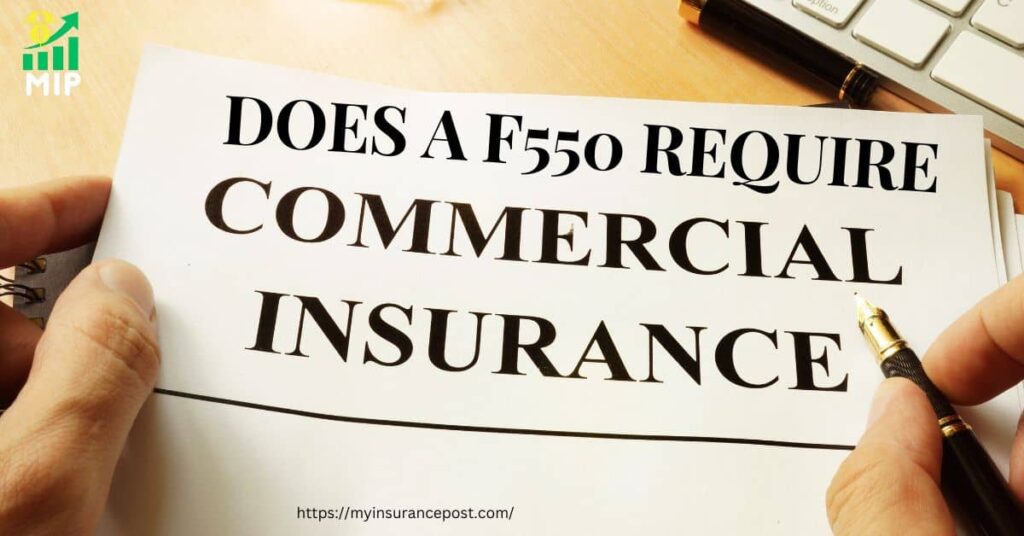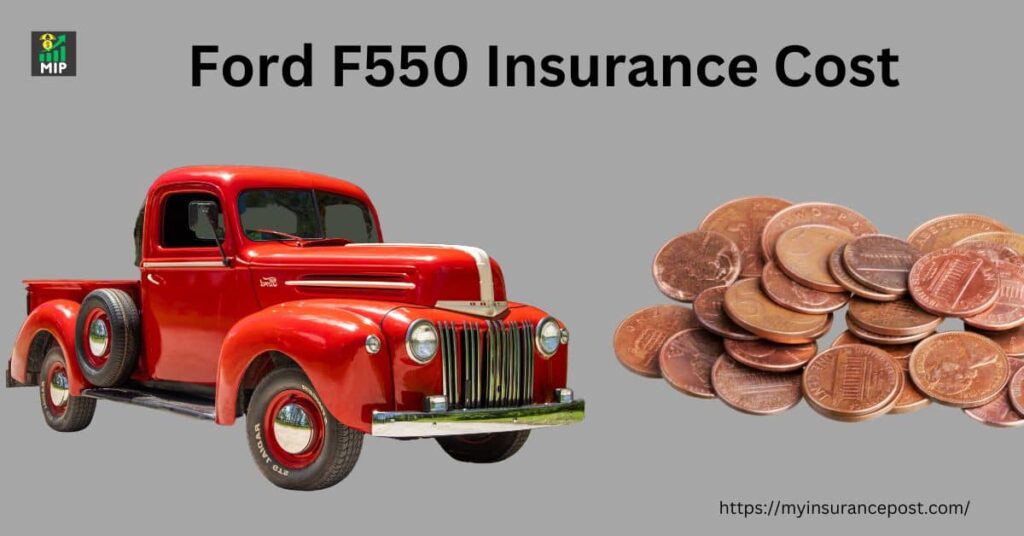Does a Ford F550 require commercial insurance? The answer hinges on how you use this powerhouse truck. If you are hauling equipment for business, towing trailers for profit, or transporting goods, commercial truck insurance is almost always mandatory. But if you are using it strictly for personal chores- like moving furniture or weekend adventures- your personal auto policy might cover you… until it doesn’t. Let’s dive into real- world stories, legal loopholes, and expert procedures to ensure you are fully protected.
Supposed: In early 2024, a Minnesota contractor faced a $ 90,000 lawsuit after his uninsured F550 tipped over on an icy road, damaging a client’s property. His insurer refused the claim, leaving him bankrupt. Stories like this aren’t rare- they are cautionary tales. By the end of this guide, you will know exactly where your F550 stands.

Contents Skip Ahead
- 1 What Makes the Ford F550 a Commercial Vehicle?
- 2 When Commercial Truck Insurance Is Legally Required for Your F550
- 3 When Personal Insurance Might Work (But Rarely Does)
- 4 5 Critical Factors That Determine Your Insurance Needs
- 5 How to Confirm If You Need Commercial Insurance: A Step-by-Step Guide
- 6 The Hidden Costs of Skipping Commercial Truck Insurance
- 7 Expert Tips to Save on Commercial Truck Insurance
- 8 Real Stories: Lessons from F550 Owners
- 9 Commercial Insurance vs. Regular Insurance
- 10 Does F550 Require a CDL?
- 11 Ford F550 Commercial Truck Insurance Cost
- 12 FAQs on Does a F550 Require Commercial Insurance?
- 13 Final Word: Protect Your Investment
What Makes the Ford F550 a Commercial Vehicle?
The Ford F550 is not just a truck- it is a commercial- grade beast. With a GVWR (Gross Vehicle Weight Rating) of up to 19,500 lbs, it is designed for heavy- duty tasks that go beyond personal use. Here is why regulators and insurers treat it differently:
Key Features Driving Insurance Requirements
- Weight Class: GVWR ranges from 17,999–19,500 lbs, far exceeding the 10,000-lb threshold that triggers commercial rules in most states.
- Common Commercial Uses:
- Towing construction equipment
- Operating as a dump truck or utility vehicle
- Running mobile businesses (food trucks, welding rigs)
- Federal DOT Regulations: Vehicles over 10,000 lbs used for business must comply with interstate commerce laws.
When Commercial Truck Insurance Is Legally Required for Your F550
1. You are Using the Truck for Business Activities
If your F550 earns you money, commercial truck insurance isn’t optional- it’s the law.
Real-Life Case (2024):
A Florida landscaper used his F550 insurance to transport lawn equipment but relied on personal insurance. After a collision with a luxury car, his insurer denied the claim, citing “business use exclusion.” He paid $62,000 out of pocket.
Expert Insight:
“Even occasional business use- like delivering goods for a side hustle- can void personal policies. Always disclose your truck’s purpose to your insurer.”
— Mark Torres, Commercial Insurance Attorney
2. You Cross State Lines for Work
The Department of Transportation (DOT) requires commercial coverage for vehicles over 10,000 lbs engaged in interstate commerce.
3. You Transport Passengers or Hazardous Materials
Carrying paying passengers (e.g., shuttle services) or hazardous materials (fuel, chemicals) demands specialized commercial policies with higher liability limits.
When Personal Insurance Might Work (But Rarely Does)
Scenario 1: Pure Personal Use
If your F550 is strictly for non-business tasks- like hauling a camper or personal landscaping- some insurers may offer personal coverage.
Catch: Most insurers still hesitate due to the F550’s weight.
2025 Example:
A Wyoming rancher insured his F550 as a “farm vehicle” but was denied coverage after lending it to a friend for a paid hauling job.
Scenario 2: Non-Profit or Recreational Use
Using the truck for volunteer work or hobbies (e.g., antique car towing) might qualify for personal insurance, but exceptions apply.
5 Critical Factors That Determine Your Insurance Needs
1. State-Specific Laws
- Texas: Requires commercial insurance for any vehicle used “in the pursuit of profit.”
- New York: Mandates commercial coverage for trucks over 10,000 lbs, even for personal use.
- California: Strict liability laws mean higher coverage minimums for business-use vehicles.
2. Vehicle Modifications
Adding equipment like snowplows, cranes, or refrigeration units automatically classifies your F550 as commercial.
Costly Mistake (2024):
An Ohio food truck owner added a custom grill to his F550 but kept personal insurance. After a kitchen fire, he owed $120,000 in damages.
3. Driver Licensing Requirements
Operating a commercial F550 insurance often requires a CDL (Commercial Driver’s License), which mandates commercial insurance.
4. Cargo Type
Hauling expensive tools, fragile goods, or hazardous materials increases liability risks and insurance costs.
5. Frequency of Use
Daily business use vs. occasional personal trips can sway insurers’ decisions.
How to Confirm If You Need Commercial Insurance: A Step-by-Step Guide
- Analyze Your Use Case
- Do you transport goods/services for profit?
- Do you cross state lines for work?
- Is your GVWR over 10,000 lbs?
- Consult Your State’s DMV/DOT Website
- Search for “[Your State] commercial vehicle insurance laws.”
- Request a Policy Review from Your Insurer
- Disclose all truck uses, including side gigs.
- Work with a Commercial Insurance Broker
- Brokers can find hybrid policies for mixed-use trucks.
The Hidden Costs of Skipping Commercial Truck Insurance
1. Claim Denials
Insurers investigate accidents thoroughly. If they find evidence of business use, you’ll bear 100% of the costs.
Example: A 2025 Georgia case saw a denied $85,000 claim after an F550 driver lied about using the truck for Amazon deliveries.
2. Fines and Penalties
- Federal DOT Fines: Up to $75,000 for uninsured interstate commercial vehicles.
- State Penalties: Fines vary; California charges $2,500 for first-time offenses.
3. Personal Liability Lawsuits
Without adequate coverage, accident victims can sue you for medical bills, lost wages, and property damage.
Expert Tips to Save on Commercial Truck Insurance
1. Bundle Policies
Combine auto, general liability, and equipment insurance for discounts.
2. Prioritize Safety Features
Install dashcams, GPS trackers, or anti-lock brakes to lower premiums.
3. Opt for Higher Deductibles
A $2,000 deductible could reduce annual premiums by 15–20%.
4. Maintain a Clean Driving Record
One speeding ticket can raise rates by 22%, per 2024 insurance data.
Real Stories: Lessons from F550 Owners
Case 1: The Part-Time Landscaper’s Mistake
Jake, a Colorado handyman, used his F550 for weekend landscaping jobs. After hitting a parked car, his insurer denied the claim, costing him $30,000.
Lesson: “Part-time” business use still requires commercial coverage.
Case 2: The Food Truck Savior
Maria upgraded to an F550 for her taco truck but skipped commercial insurance. A grease fire led to $200,000 in liabilities, bankrupting her business.
See Also: Good Sam Skoolie Insurance: Affordable Coverage for Your Bus Conversion Dreams!
Commercial Insurance vs. Regular Insurance
When it comes to insuring your wheels, there’s more to it than just picking a policy and rolling with it. You have got options, my friend, and today we are diving into the wild world of commercial insurance versus regular insurance. Buckle up!

In a Nutshell:
- Commercial Insurance: This one’s like a heavyweight champ in the insurance arena. It is designed for businesses and their trusty workhorses –commercial vehicles. If you are hauling goods, making deliveries, or rocking a company van, this is your jam.
- Regular Insurance: Picture this as your everyday insurance buddy. It is all about covering your ride, the one you take for grocery runs, soccer practice, and road trips. Think family sedan, not the delivery van.
What is the Big Difference?
- Coverage Scope: Commercial insurance has your back when you are on the clock. It handles those gnarly business-related accidents and damages. Regular insurance? It is all about your daily commute and weekend escapades.
- Liability Limits: When you are in the commercial club, you are playing with bigger stakes. Commercial insurance often packs higher liability limits. Regular insurance keeps things a bit more laid-back in this department.
Cost Talk:
- Commercial Insurance: Expect to dig a bit deeper into your wallet. Commercial insurance is not the thrift store of insurance options. The robust coverage comes at a cost, my friend.
- Regular Insurance: Your daily driver gets the budget-friendly treatment here. Regular insurance usually won’t break the bank, making it perfect for your personal wheels.
Bottom Line:
In the showdown between commercial insurance and regular insurance, it is all about the kind of ride you are insuring. If it is for business, go commercial. For personal trips and errands, stick with regular. No matter which lane you are in, stay safe out there on the open road!
Does F550 Require a CDL?
We touched on this earlier, but let’s reiterate: Whether your Ford F550 requires a CDL depends on how you are using it. For personal use, a CDL is generally not required. However, for commercial use, especially if your F550 exceeds weight limits set by your state, a CDL might be necessary. Always check with your local DMV to ensure compliance with state regulations.
Ford F550 Commercial Truck Insurance Cost
The average annual cost of commercial truck insurance for a Ford F550 Super Duty is about $2,941. That’s more than the national average for popular heavy- duty models by a solid $716. Now, let’s break down the factors that can rope in these insurance costs:

- First off, we have got the usual suspects:
The driver’s age, gender, and driving record: Younger drivers and those with a history of accidents or traffic violations will pay more for insurance. So, if you have got a lead foot or a knack for fender-benders, expect those premiums to climb like a mountain.
- Then, there is the truck itself:
It makes natural that insurance would be a little more expensive for the Ford F550 Super Duty given that it is a more expensive car than many others available on the market.
- Do not forget about the big one:
The truck’s GVWR (Gross Vehicle Weight Rating): The higher the GVWR, the more you will be shelling out for insurance. This rating measures the maximum weight of the truck & its cargo, and it is a key player in determining your premiums.
- And of course, we have the bells and whistles:
The truck’s features can also tip the scales. If you have decked out your F550 Super Duty with all the latest gadgets like tow packages and backup cameras, well, that is gonna bump up your insurance costs too.
- Now, let’s talk location:
Your geographical stomping grounds matter. The price of insurance varies from state to state. Be prepared to dig a little more into your wallet for coverage if you live in a neighborhood where accidents & theft are common. But do not worry yet!
Here are some savvy ways to steer those insurance costs in a more wallet-friendly direction:
- Take a defensive driving course: It might sound a bit old-school, but it can slash your insurance premium by up to 10%.
- Keep that driving record squeaky clean: Avoid accidents and traffic violations like the plague. A blemish-free record is music to insurers’ ears.
- Consider increasing your deductible: Sure, it means shelling out more if you need to file a claim, but it will lower your monthly premium.
- Bundle up: If you have got other insurance policies, like homeowners’ or renters insurance, see if bundling them together can wrangle you a discount.
- Finally, compare prices: Do not be afraid to request quotations from other insurance providers. It is similar to bargaining at a flea market; you never know when you will find a deal that makes you grin ear to ear.
FAQs on Does a F550 Require Commercial Insurance?
Q1: Can I use my F550 for Uber or Lyft?
A: No. Ride-sharing platforms require commercial insurance for vehicles over 10,000 lbs. Personal policies exclude paid passenger transport.
Q2: How much does commercial insurance cost for an F550?
A: Rates range from 1,800–5,000 annually, depending on use, location, and coverage limits.
Q3: Does farm use exempt me from commercial insurance?
A: Sometimes. States like Iowa offer “farm vehicle” exemptions, but you must prove non-commercial use.
Q4: What if I only use my F550 seasonally?
A: Insurers often offer “laid-up” policies for seasonal use, reducing costs when the truck is idle.
Q5: Can I switch back to personal insurance after stopping business use?
A: Yes, but you will need documentation proving the F550 is no longer used commercially.
Final Word: Protect Your Investment
The Ford F550 is a rugged ally for business owners, but cutting corners on insurance can destroy your finances. When in doubt, choose commercial coverage. It’s cheaper than a lawsuit.